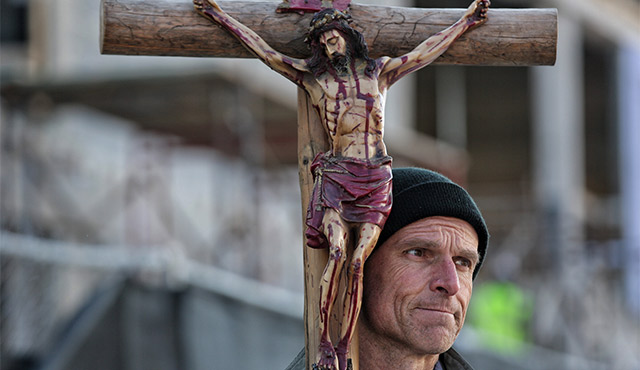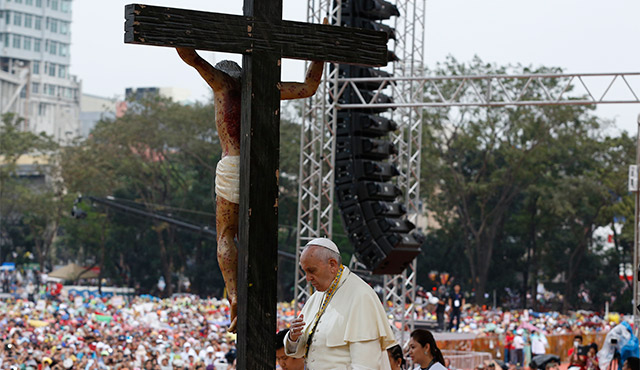Redemptive suffering can strike us as one of those medieval Catholic concepts that cause our Protestant brothers and sisters to roll their eyes. So when Pastor Rick Warren of Saddleback Church addresses “The Purpose of Redemptive Suffering” in his Daily Hope column, it might be time for both Catholics and Protestants to settle down and take a new look at some ancient wisdom.
It is natural, when bad things happen to us, to blame God, others, or ourselves or simply to allow our very soul to sink into an abyss of sadness and grief. But if we allow suffering to open us to the needs of others then the entire journey, from shock to acceptance, leads us closer to God. Suffering becomes hope. Hope becomes joy. But it may take until we reach heaven to feel it.
Suffering teaches us that through pain we become aligned with Christ on the cross whose horrific suffering led to the joy of salvation. According to Pastor Warren, “Your pain often reveals God’s purpose for you. God never wastes a hurt!” In Romans 8:18 St. Paul says, “I consider that the sufferings of this present time are as nothing compared with the glory to be revealed for us.” Redemptive suffering transforms our pain into a tool for the greater good. That is the crack in the wall where healing and hope can enter.
According to Father Troy Schneider, associate pastor at Holy Family Cathedral in Orange, “God turns every evil into good, but it is often hard for us to see how this will happen. Redemptive suffering links us directly to the cross. We cannot redeem ourselves, but we must accept Jesus at his word and take up our cross and follow him.” That cross leads us to Calvary but it does not end there. Calvary is the necessary suffering that leads to the resurrection and redemptive joy.
In today’s culture, avoiding suffering is embraced with missionary zeal. Not that we would wish suffering on anyone, but as St. Thomas Aquinas wrote, if suffering means something then there is value in it. “If there is no meaning to suffering, there is no meaning to anything, no meaning to happiness or joy either,” says Fr. Schneider. “We are told that it is merciful to bypass the suffering associated with sickness and death through assisted suicide. Dying people are closer to Christ than we are. Christ is in the midst of that suffering. Life is a gift and even at the end we must choose between good and evil.”
In his book John Paul II and the Meaning of Suffering, author Robert Schroeder says, “With suffering, there are no escape clauses. Its sharp tendrils reach all of us and cut deeply. But what if we could turn the tables on suffering – not by eliminating our pain altogether but by doing something to give it purpose and meaning? What if we could do good through our suffering? According to John Paul, that is precisely what our relationship with Jesus Christ empowers us to do.”
For suffering to have meaning it must be “for” something. How many of us remember nuns telling us to “offer up” our little pains and annoyances? And as trite as this may sound today, there is abundant wisdom behind it. Offering our suffering for others or for the glory of God puts us side-by-side with Christ on the cross. That is precisely what he did. He “offered up” His pain for the sake of mankind and He calls us to take up our own cross and do the same. No whining. No pity-party. No bailing out along the way. Taking the cross is a heavy burden but it is the only way to get to the joy of salvation. No pain, no gain.
The good news is that God helps us endure because what we go through has value. “Take my yoke upon you and learn from me, for I am meek and humble of heart; and you will find rest for yourselves.” MT 11:23.
Redemptive suffering does not mean that we have to go looking for trouble or make a spectacle of ourselves. As Archbishop Fulton Sheen said, “Penance does not require hair shirts today; our neighbors are our hair shirts.” Reconciliation is the final step in healing. It puts us right with God and completes the redemptive process. According to Fr. Schneider, “God created the universe in an explosion of love, something scientists call the ‘Big Bang.’ At some point that love between God and man was ruptured and the entire universe feels the effect of this rupture. This is the genesis of suffering. Jesus, through his passion, heals the rupture and through confession we are personally healed in our relationship with God. It is not just confessing sins; it is agreeing to get into a right relationship again with God.”
Because all we know is this mortal life, it is difficult to fathom the immensity of eternity. Sometimes we have to just hold on to our faith and the knowledge that in the end “this too shall pass.” The pain and suffering will all be worth it and it will somehow make sense. In the meantime, Lent is a good time to reflect on how we can use our pain and suffering for positive change and the benefit of others. It is also a good time to go to confession, get right with God and when disaster strikes, offer it up. Good old Sister Mary Francis was right.


